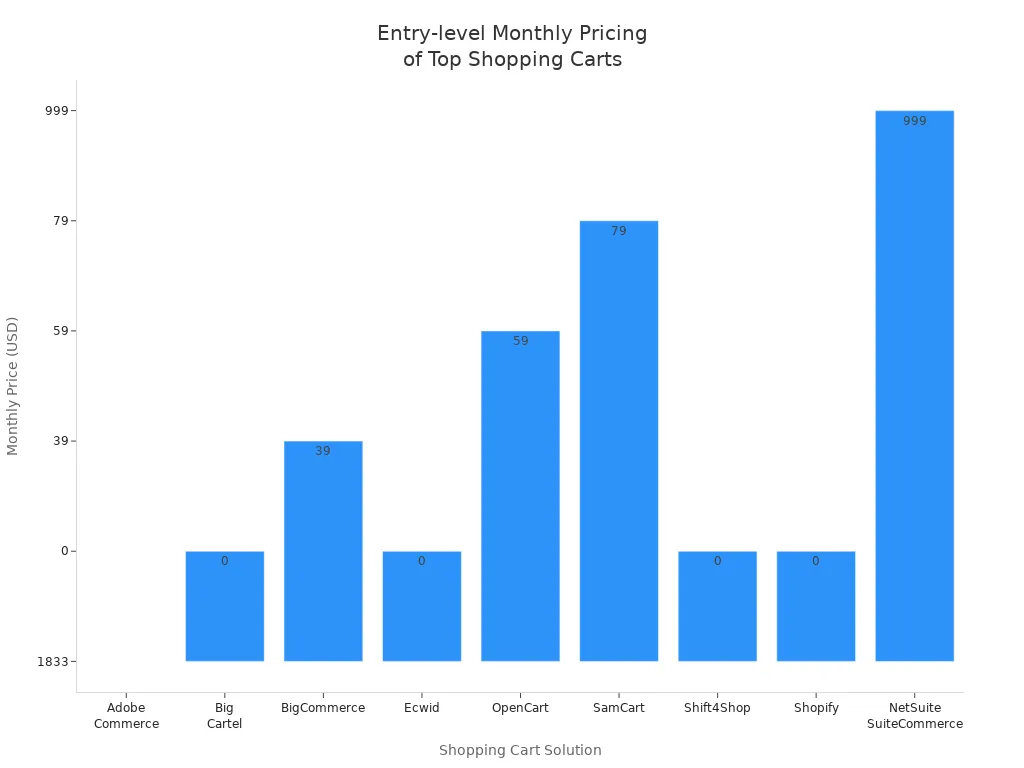Shopping Cart Hosting Solutions: Self-Hosted vs. Cloud-Based Options in 2025

In 2025, cloud-based shopping cart hosting leads the ecommerce market with about 65.8% share, thanks to easy management and flexible pricing. You may find these platforms best if you want quick setup and simple scaling for your ecommerce website. Self-hosted hosting attracts large online businesses that need full control and advanced customization. When you choose the right ecommerce platform, think about your technical skills, business size, and long-term goals. Your decision shapes how your platform grows and supports your ecommerce journey.
Key Takeaways
Self-hosted platforms offer full control and deep customization but need technical skills and more maintenance.
Cloud-based platforms are easy to set up, include hosting and security, and provide strong support for beginners.
Choose self-hosted if you want to customize your store fully and have technical resources to manage it.
Pick cloud-based if you want quick launch, simple scaling, and less technical work for your online store.
Consider your business size, goals, and skills carefully to select the best ecommerce platform for long-term success.
Quick Comparison: Shopping Cart Hosting

Self-Hosted vs. Cloud-Based
When you compare shopping cart hosting options, you will see two main choices: self-hosted and cloud-based. Each platform offers unique features for your online store. Self-hosted ecommerce platforms give you full control over your shopping cart software. You manage your own web hosting with shopping cart, handle updates, and take care of security. This option lets you customize every part of your ecommerce platform, but you need technical skills to keep your site running smoothly.
Cloud-based shopping cart solutions, also called hosted shopping cart platforms, make things easier for you. The provider manages all hosting, security, and updates. You get a user-friendly interface and built-in tools for your ecommerce store. These ecommerce solutions often include a content delivery network (CDN) and strong uptime guarantees. You do not need to worry about server maintenance or backups.
Here is a quick table to help you compare these shopping cart hosting options:
Feature | Self-Hosted Shopping Cart Software | Cloud-Based Shopping Cart Solutions |
|---|---|---|
Control & Customization | Full control, advanced customization | Limited customization, easy to use |
Maintenance | You manage updates and security | Provider handles everything |
Cost | Pay for web hosting with shopping cart, security, and support | Subscription covers hosting, support, and security |
Uptime & Performance | You ensure uptime and speed | Provider guarantees high uptime |
Security & Compliance | You handle PCI compliance | Provider manages security automatically |
Best Fit by Business Type
You should choose your ecommerce platform based on your business needs. Self-hosted shopping cart hosting works best for businesses with strong technical skills. If you want full control, advanced features, and unique workflows, this option fits you. Many IT companies and businesses that need custom ecommerce solutions pick self-hosted platforms like WooCommerce or Magento.
Cloud-based hosted shopping cart platforms suit most small and medium businesses. If you want to launch your online store quickly and avoid technical tasks, these shopping cart solutions are ideal. You get reliable web hosting with shopping cart, easy setup, and expert support. Many of the best ecommerce platforms use this model, making it simple for you to grow your ecommerce business.
Tip: Think about your technical skills and how much control you want before picking your shopping cart hosting option. The right ecommerce platform will help your online store succeed.
Self-Hosted Ecommerce Platforms
Overview and Features
You may want a self-hosted solution if you need full control over your ecommerce store. Self-hosted ecommerce platforms let you install and manage the ecommerce software on your own server or a web hosting provider. You decide how your platform looks, how it works, and which features you add. This approach gives you the power to shape your ecommerce functionality to fit your business.
Here is a table showing some of the most popular self-hosted ecommerce platforms in 2025:
Platform | Key Features | Tech Stack | Best For | Pricing |
|---|---|---|---|---|
CozyCommerce | One-click deployment, built-in CMS, payment & AI integrations, fully customizable | Next.js, Tailwind CSS, Prisma ORM, PostgreSQL, Algolia | Developers needing a modern, scalable Next.js solution | $99 one-time + hosting cost |
MedusaJS | Headless architecture, multi-currency, plugin system, easy API integration | Node.js, PostgreSQL | Businesses wanting a free, API-first eCommerce | Free, hosting & premium extra |
Bagisto | Multi-store & product management, localization, headless with REST API | PHP (Laravel), MySQL | Developers seeking WooCommerce alternatives | Free, paid templates & extensions |
Evershop | Lightweight, fast setup, customizable, Node.js based | Node.js | Small to medium businesses wanting speed & flexibility | Open-source, hosting cost |
You can choose a platform that matches your technical skills and business needs. Each platform offers different ecommerce functionality, from built-in content management to advanced payment integrations.
Pros and Cons
Self-hosted ecommerce platforms give you many advantages. You get total control over your online store’s technical setup. You can change the code, add new features, and make your platform unique. You also own your data, which helps with privacy rules like GDPR and CCPA. Many self-hosted platforms are open-source, so you can move your store to another provider if you want.
Note: You must handle updates, security patches, and server maintenance yourself. This can take time and may need technical skills.
Here are some main pros and cons of using a self hosted ecommerce solution:
Pros:
Full control and flexibility over your ecommerce platform.
Deep customization of design and ecommerce functionality.
Data ownership and privacy compliance.
Open-source ecommerce software makes migration easier.
Cons:
You must manage hosting, backups, and upgrades.
Security is your responsibility.
Costs can rise as your site grows.
Steep learning curve for beginners.
Self-hosted ecommerce platforms work best if you want to shape every part of your store and have the resources to manage the technical side. You gain freedom, but you also take on more responsibility for your platform’s success.
Cloud-Based Shopping Cart Solutions

Overview and Features
Cloud-based shopping cart solutions give you a simple way to launch and manage your online store. These fully hosted ecommerce solutions handle all the technical details for you. You do not need to worry about server setup, software updates, or security patches. The provider manages everything behind the scenes, so you can focus on growing your ecommerce business.
You can choose from many popular ecommerce platforms in 2025. Each hosted shopping cart service offers unique features and pricing. Here is a table to help you compare some of the top options:
Shopping Cart Solution | Key Features | Pricing Highlights |
|---|---|---|
Adobe Commerce | Multi-channel selling, customizable platform, B2B tools, analytics | $22,000–$125,000/year; Cloud $40k–$200k |
Big Cartel | Simple setup, customizable templates, no transaction fees, mobile-ready | Free–$30/month |
BigCommerce | Unlimited products, Google Shopping, no transaction fees, advanced SEO | $39–$399/month; 15-day free trial |
Ecwid | Multi-channel sales, instant site builder, inventory management | Free–$105/month |
OpenCart | User-friendly, open source, multi-store, integrated payments | Free; hosting from $59/month |
SamCart | Drag & drop builder, one-click upsells, analytics | $79–$319/month; 7-day free trial |
Shift4Shop | No transaction fees, PCI-compliant, unlimited products, analytics | Free–$29/month; 15-day free trial |
Shopify | Drag-and-drop, 8,000+ apps, 24/7 support, multi-channel selling | Pricing varies |
NetSuite SuiteCommerce | Unified B2B/B2C, real-time inventory, CRM integration | $999–$3,000/month; custom pricing |

Most hosted shopping cart platforms offer features like mobile optimization, SEO tools, and analytics. You can access your online store from anywhere with an internet connection. Many ecommerce solutions also include marketing automation and inventory management. With a cloud-based platform, you get 24/7 customer support through phone, live chat, or email. This support helps you solve problems quickly and keeps your online store running smoothly.
Pros and Cons
You will find many benefits when you use a hosted shopping cart service. These fully hosted ecommerce solutions make it easy to set up your online store. You do not need strong IT skills. The provider takes care of hosting, security, and software updates. You can scale your ecommerce business as it grows, adding more products or handling more traffic without extra effort.
Tip: Hosted shopping cart platforms help you avoid extra fees and keep your operations simple by managing everything in one place.
Here are some main pros and cons of cloud-based ecommerce platforms:
Pros:
Easy to set up and use, even for beginners.
Lower upfront costs compared to self-hosted ecommerce platforms.
Provider manages hosting, security, and updates.
24/7 customer support helps you solve issues fast.
Access your online store from any device.
Advanced features like analytics and marketing tools.
Cons:
Less control over security and data management.
Limited customization compared to self-hosted ecommerce solutions.
You need a stable internet connection to manage your online store.
Some platforms may have restrictions on personalization.
A hosted shopping cart service works best if you want a simple, reliable way to run your ecommerce business. You can focus on sales and customer service while the platform handles the technical side.
Key Comparison Factors
Cost and Pricing
When you compare shopping cart solutions, cost is often the first thing you notice. Self-hosted ecommerce platforms let you choose your own hosting provider, which can make monthly fees lower. You pay for your domain, which usually costs $10 to $50 per year. SSL certificates for security can range from $50 to $500 each year. These options give you flexibility, but you may face higher upfront costs and extra fees for maintenance or development.
Cloud-based ecommerce platforms bundle hosting, security, and support into a single subscription. Most plans start at about $39 per month. This price covers hosting, PCI compliance, and site uptime. You may pay more for add-ons or higher traffic, but you get predictable monthly costs and less technical work.
Here is a table to help you compare the main cost components:
Cost Component | Self-Hosted Ecommerce Platforms | Cloud-Based Shopping Cart Solutions |
|---|---|---|
Hosting | $1.99–$13.99/month | Included in subscription (from $39/month) |
Domain Name | $10–$50/year | $15/year (often separate) |
SSL Certificate | $50–$500/year | Included |
Maintenance & Scaling | Can exceed $1,000/month for large sites | Included or minimal, add-ons possible |
Upfront Costs | Higher, with setup and customization | Low, subscription-based |
Tip: Self-hosted options can save you money if you have technical skills, but cloud-based platforms offer peace of mind with one monthly fee.
Control and Customization
You get the most control with self-hosted ecommerce platforms. You can change the source code, add new features, and design your online store exactly how you want. This flexibility lets you build unique shopping cart solutions for your business. You manage updates, hosting, and security, so you decide how your platform works.
Cloud-based platforms limit your control. The provider manages the infrastructure, updates, and hosting. You can use built-in features and approved third-party apps, but you cannot change the core code. This makes setup easy, but you may not get every feature you want.
Aspect | Self-Hosted Ecommerce Platforms | Cloud-Based Shopping Cart Solutions |
|---|---|---|
Control & Autonomy | Limited, provider manages infrastructure | |
Customization | High, add extensions and features | Limited to built-in tools and apps |
Maintenance | You handle updates and security | Provider manages everything |
Note: If you want a platform you can shape and control, self-hosted options are best. If you want simplicity, cloud-based platforms work well.
Security and Compliance
Security is critical for any ecommerce business. Both self-hosted and cloud-based shopping cart solutions focus on strong security and PCI compliance. Self-hosted platforms let you set up custom PCI-compliant servers, daily backups, and dedicated IP addresses. You must manage updates and security patches to keep your online store safe.
Cloud-based platforms include PCI compliance and security in their service. Providers like Shopify use 256-bit SSL certificates and meet Level 1 PCI-DSS standards. They handle malware scanning, DDoS protection, firewalls, and regular backups. You get automatic updates and 24/7 support to keep your site uptime high.
Common security features in 2025 include:
Free SSL certificates for encrypted online transactions
PCI compliance for safe payment processing
Malware scanning and brute force attack defense
Automated onsite and offsite backups
Web Application Firewall (WAF)
24/7 support for security issues
Callout: Cloud-based platforms make PCI compliance easier by handling most requirements for you. Self-hosted platforms give you more control but require more work to stay secure.
Scalability and Support
Your ecommerce platform must grow with your business. Cloud-based shopping cart solutions scale automatically. The provider adjusts resources to handle more traffic, products, or sales. You do not need to worry about site uptime or performance during busy times. Features like load balancing and content delivery networks (CDNs) keep your online store fast and reliable.
Self-hosted platforms give you control over scaling, but you must manage your own servers and hosting. You can add resources as needed, but this takes technical skill and planning. If your site grows quickly, you may need to upgrade your hosting or hire IT support.
Scalability Aspect | Self-Hosted Ecommerce Platforms | Cloud-Based Shopping Cart Solutions |
|---|---|---|
Scaling Resources | Manual, needs technical skills | Automatic, managed by provider |
Site Uptime | You are responsible | Provider guarantees high uptime |
Support | May cost extra or need IT staff | Included 24/7 with most subscriptions |
Tip: Choose a hosted shopping cart service if you want easy scaling and strong support as your business grows.
Technical Skills Needed
You need different skills for each platform type. Self-hosted ecommerce platforms require moderate to high technical knowledge. You must know about web hosting, server management, security, and updates. You may need to write code or hire developers for custom features.
Cloud-based shopping cart solutions are much easier to use. The provider manages hosting, security, and updates. You can set up your online store with little or no technical experience. Most platforms offer step-by-step guides and customer support.
Platform Type | Technical Skill Level Required | Key Points |
|---|---|---|
Self-Hosted | Moderate to High | Manage hosting, security, updates, code |
Cloud-Based Hosted | Low | Provider handles technical tasks |
Note: If you want to focus on sales and marketing, a hosted shopping cart service is the best option. If you enjoy technical work and want full control, self-hosted platforms are a good fit.
Choosing the Right Ecommerce Platform
When to Choose Self-Hosted
You should consider a self-hosted platform if your business needs full control, advanced customization, or plans to scale quickly. This option works well for companies with strong technical skills or access to developers. You can change every part of your ecommerce site, from design to features. You also avoid vendor lock-in and keep full ownership of your data. Many larger businesses choose this route to save on long-term costs and avoid recurring fees.
Here is a table showing when self-hosted hosting is the best fit:
Business Scenario | Why Self-Hosted is Best Choice | Example Platforms |
|---|---|---|
Need full control & customization | Deep modification of store design, features, and integrations beyond hosted platform limits | WooCommerce, Magento |
Planning significant scaling | Supports large catalogs and complex product offerings without platform restrictions | Magento, OpenCart |
Want to avoid vendor lock-in | No dependency on platform policies or pricing changes; full data ownership | WooCommerce, OpenCart |
Have technical skills or developer access | Enables custom tool integration, infrastructure control, and tailored functionality | Magento, WooCommerce |
Seeking cost efficiency long-term | Avoids recurring platform fees and transaction charges, reducing ongoing costs | Magento, OpenCart |
Content-driven brand | Combines strong content management with ecommerce capabilities | WooCommerce |
Tip: If you have a technical team and want to build a unique online store, a self-hosted platform gives you the most freedom.
When to Choose Cloud-Based
A cloud-based platform is the best choice if you want to launch your ecommerce business quickly and with less technical effort. You do not need to manage servers or worry about security updates. This type of hosting lets you focus on sales and customer service. Most small and medium businesses pick cloud-based solutions because they offer fast setup, easy scaling, and predictable costs.
You should choose a cloud-based platform if:
You have limited technical resources.
You want to avoid high upfront costs.
You plan to grow your ecommerce business fast.
You need reliable support and automatic updates.
You want to manage your online store from anywhere.
Cloud-based platforms work well for startups and growing brands. You can add new features as your business expands. The best ecommerce platforms in this category help you stay focused on your customers, not on technical details.
Note: Your technical resources, growth plans, and budget shape your decision. If you want a simple, scalable solution, cloud-based hosting is the right path.
Trends in Ecommerce Platforms 2025
Technology and Integrations
You will see rapid changes in ecommerce technology this year. Many platforms use AI-driven personalization to create shopping experiences that match each customer’s needs. Real-time recommendations and tailored content help you boost sales and keep shoppers engaged. Social commerce lets you sell directly on social media, making it easier for customers to buy from your store. Voice and conversational commerce are growing, so shoppers can use smart speakers or chatbots to place orders.
Augmented reality helps customers try products virtually, which reduces shopping anxiety. Many ecommerce platforms now connect with ERP systems to sync stock levels and improve inventory management. This integration gives you better insights into sales trends and customer behavior. You can also use advanced fulfillment services, like ShipBob and Amazon FBA, to speed up delivery and lower costs. Platforms now support modular, API-driven architectures, making it easy to add new features and connect with third-party services.
AI-powered customer service, such as advanced chatbots, makes it easier for you to help shoppers quickly and efficiently.
Security and Regulations
Security is a top concern for every ecommerce business. In 2025, platforms face new challenges as omnichannel expansion increases the risk of attacks. You must watch for vulnerabilities in APIs and protect against social media phishing. First-party fraud, especially with Buy Now, Pay Later services, is rising. Advanced identity verification and behavioral biometrics help reduce these risks.
You need to follow strict regulations like PCI DSS v4.0, which requires stronger passwords, multi-factor authentication, and regular vulnerability scans. New privacy laws in states like Maryland and Oregon, along with international rules such as GDPR and the EU AI Act, demand careful data handling. Ecommerce platforms must also manage third-party risks and supply chain threats, including Magecart attacks.
Tip: Always use encryption, access controls, and regular security assessments to protect your customer data.
Future-Proofing Your Store
You can keep your ecommerce store competitive by adopting future-proof strategies. Many platforms now use AI for hyper-personalization and predictive inventory management. Modular, API-first architectures give you flexibility to add new features as your business grows. Eco-friendly systems help you reduce environmental impact and improve delivery speed.
To stay ahead, focus on customer engagement through creative marketing and a strong social media presence. Agile systems let you adapt quickly to new trends and customer needs. These steps help your store remain resilient and ready for any changes in the ecommerce landscape.
Callout: Prepare your platform for the future by choosing flexible technology, strong security, and sustainable practices.
Choosing between a self-hosted or cloud-based ecommerce platform shapes your store’s future. Self-hosted options give you control and deep customization, while cloud-based platforms offer easy setup and less maintenance. Use these steps to guide your decision:
Define your business goals and customer needs.
Hold workshops to list technical requirements for your platform.
Compare each ecommerce platform’s scalability, cost, and support.
Plan for long-term growth and adaptability.
Take time to match your technical skills and business plans with the right platform. This helps you avoid common mistakes and build a strong ecommerce presence.
FAQ
What is the main difference between self-hosted and cloud-based ecommerce platforms?
Self-hosted platforms give you full control over your store and data. You manage everything. Cloud-based platforms handle hosting, security, and updates for you. You focus on selling, not technical tasks.
Can I switch from a cloud-based platform to a self-hosted one later?
Yes, you can move your store. You will need to export your data and set up your new platform. Some platforms offer migration tools to help you.
Do I need coding skills to use a self-hosted ecommerce platform?
You need some technical knowledge for self-hosted platforms. You may need to install software, update code, or fix issues. Cloud-based platforms do not require coding skills.
How do cloud-based platforms handle security?
Cloud-based platforms manage security for you. They use strong encryption, regular updates, and follow industry standards like PCI DSS. You get automatic protection for your store and customers.
Which option is better for a small business just starting out?
Cloud-based platforms work best for most small businesses. You get easy setup, support, and lower upfront costs. You can start selling quickly without worrying about technical details.
See Also
Exploring Cloudpick Self-Checkout Locations And User Feedback In 2025
The Impact Of AI Tools On Managing Online Retail Stores
Cloudpick’s Role In Delivering Seamless Cashierless Shopping Experiences
A Detailed Comparison Of Amazon Go Versus Cloudpick Technologies
How Cloudpick Checkout Systems Improve Efficiency And Customer Access
